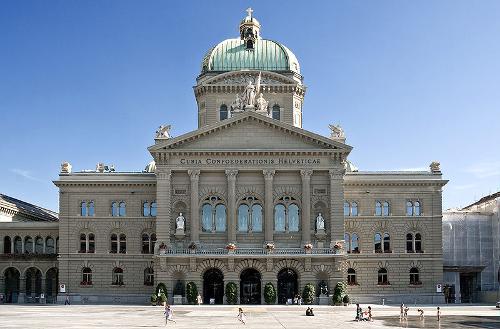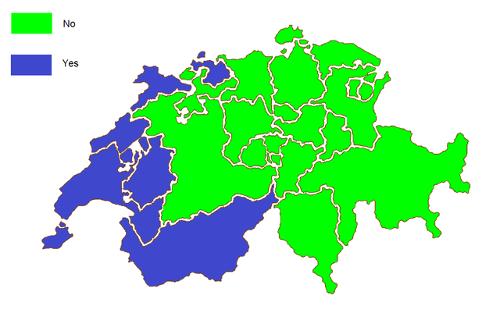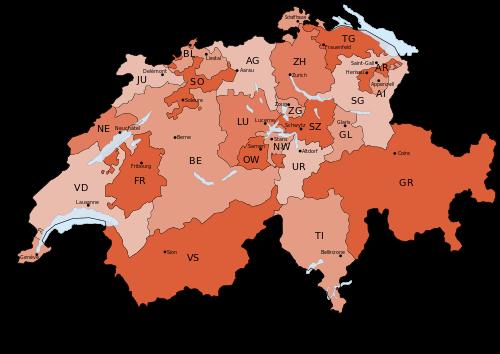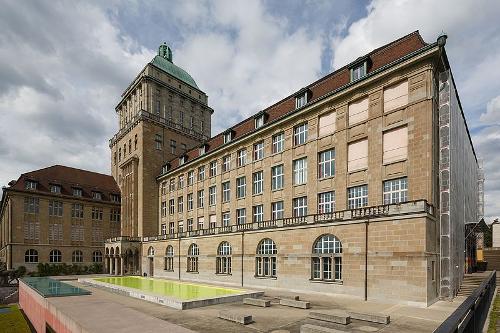SWITZERLAND
Society

Society

Cities in SWITZERLAND
| Bern | Zurich |
Society
State structure
 Parliament building SwitzerlandPhoto: Floofy CC 2.0 Generic no changes made
Parliament building SwitzerlandPhoto: Floofy CC 2.0 Generic no changes made
Switzerland is a democratic federal state and has consisted of 23 cantons and 3 semi-cantons since 1976. Switzerland has been a republic since 1848. The cantons have their own government and parliament, the “Kantonsrat”, their own constitution and their own jurisdiction. Its members are immediately elected for four years. Universal suffrage from the age of 18 has only existed in Switzerland since 3 March 1991. Active and passive women's suffrage was not introduced at the federal level until 1971. On cantonal resp. at municipal level it has only been implemented gradually; in 1990 it was introduced in the last canton (Appenzell). The Bundesversammlung, the legislative power, consists of two chambers: the Nationalrat (second chamber) and the Ständerat (first chamber). The Nationalrat (200 members) has one elected representative per 30,000 inhabitants, and each canton has at least one seat. The Ständerat has two members from each canton, a total of 46. The Bundesversammlung elects the members of the Bundesrat, comparable to the Dutch cabinet. The seven members each run a ministry and are responsible for nationally important matters such as foreign policy, defense, finance and judicial legislation. One of the seven members is President of the Bundesrat for a year and also President of the Federal Republic.
 Result EU referendum SwitzerlandPhoto: Paasikivi CC 4.0 International no changes made
Result EU referendum SwitzerlandPhoto: Paasikivi CC 4.0 International no changes made
The Swiss people can request a referendum on federal laws and general union decisions and are even obliged to do so in the case of constitutional changes. One also has the right of initiative, a request for constitutional amendments. Only in 1971 did women receive universal suffrage.
 Switzerland CantonsPhoto: Poulpy CC 3.0 Unported no changes made
Switzerland CantonsPhoto: Poulpy CC 3.0 Unported no changes made
Administrative division
The large cantons are divided into districts (Amtsbezirke) and consist of a number of municipalities. Each district is headed by a prefect (Regierungsstatthalter), who represents the cantonal government. The nearly 3000 municipalities play an important role in Swiss democracy. In many areas the municipality decides; in the event of a difference of opinion, the cantonal government takes action. Typical of this important role is that a foreigner who wants to acquire Swiss nationality must first be accepted as a citizen in a municipality; if that is the case, he will receive a pass as a citizen of a canton. For the current political situation see chapter history.
Education
 University of Zurich, SwitzerlandPhoto: CEphoto, Uwe Aranas CC 3.0 Unported no changes made
University of Zurich, SwitzerlandPhoto: CEphoto, Uwe Aranas CC 3.0 Unported no changes made
The state only provides general guidelines that the quality of education must at least meet. Education is actually arranged at the cantonal level in the first instance. In many cases, especially with regard to primary education, educational matters are arranged by the municipalities and also paid to a large extent by the municipalities. Primary education is free in all cantons. Compulsory education has existed in all cantons since 1874, but the compulsory school age may differ per canton. Each canton has its own rules and laws regarding all forms of education. Education is compulsory throughout the country, which varies from eight to ten years. Lessons are given in the four official languages and at the 'Volksschulen' learning at least two of the official languages is compulsory. Secondary education lasts three to five years and consists of vocational education, pre-higher education and pre-university education. There are seven universities: in Basel, Bern, Zurich and St. Gallen (all German-speaking) and in Friborg, Geneva, Neuchâtel and Lausanne (all French-speaking).
Higher education also includes two technical colleges in Zurich and Lausanne, a university of applied sciences and social sciences in St. Gallen and a theological faculty in Lucerne. Switzerland also has many special professional training courses, such as hotel vocational schools, art academies, conservatories, etc., and many private schools and boarding schools. These are often visited by foreigners.
Sources
Dominicus, J. / Zwitserland
Gottmer
Lamme, M. / Zwitserland
Kosmos-Z&K
Lannoo’s autoboek Zwitserland
Lannoo
Mandos, M. / West- en Midden-Zwitserland
ANWB
CIA - World Factbook
BBC - Country Profiles
Last updated June 2025Copyright: Team The World of Info